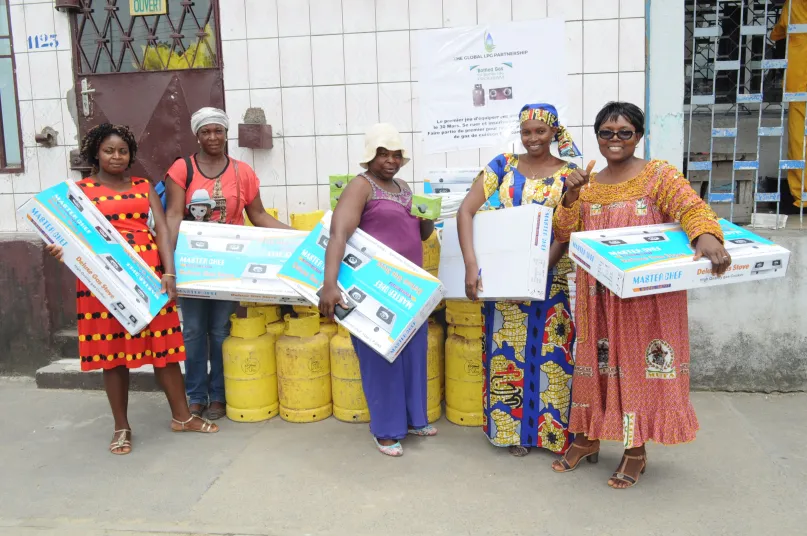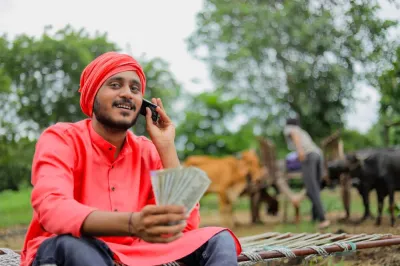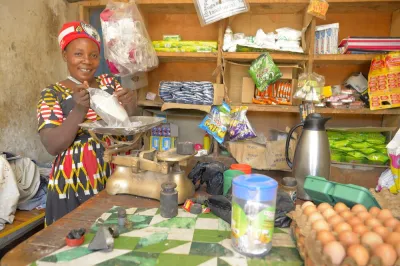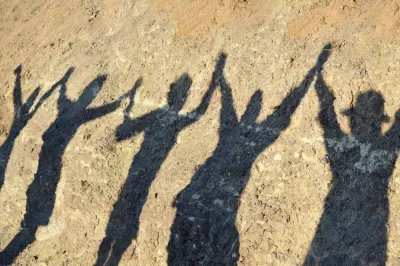Making Clean Cooking Affordable

Globally, 3.8 million premature deaths each year are attributed to indoor air pollution.
Nearly three billion people still cook using polluting fuels such as charcoal, firewood or kerosene. These fuels emit smoke containing harmful particulate matter, affecting the health of millions of women and children in the developing world.
Bottled gas (also known as liquefied petroleum gas, or LPG) is one of very few fuels endorsed by the World Health Organization for clean cooking due to its low emissions profile and combustion efficiency. Cooking with LPG improves health and reduces cooking time. LPG use also protects forests from degradation, by reducing or eliminating the need for firewood gathering or charcoal production.
What is keeping people from clean cooking with LPG?
Although families across Africa want LPG, some low-income households hesitate to make the switch. A key reason is the upfront cost barrier of purchasing needed equipment. An LPG “start-up kit” includes a filled, generally 13kg, gas cylinder – which lasts a month on average – plus a double burner stove and accessories, costing in total around $85 to $100.
Another challenge is that LPG cylinders are re-filled on a monthly basis, requiring a significant expenditure at one time, while fuels like charcoal can be purchased in small daily amounts. This creates the perception that LPG is expensive, even though LPG actually costs just 50 to 60 percent of the cost of charcoal or firewood for cooking an equivalent number of meals.
In India, the government subsidizes LPG equipment for the rural poor to help overcome the initial cost barrier. In countries where such government support is not available, innovative consumer financing solutions can help customers afford to make the switch to LPG. Microfinance and "Pay As You Go" (PayGo) are two approaches being tried for this purpose in Sub-Saharan Africa.
Microfinance loans for LPG upfront costs
 Through the Global LPG Partnership's (GLPGP) pilot microfinance initiative, Bottled Gas For Better Life, more than 700 low-income families in Cameroon and Kenya have made the switch to LPG over the last two years. Loans cover the cost of LPG start-up equipment, are re-paid over six monthly payments, and include a refundable security deposit. Fixed loan repayment schedules allow low-income customers to plan their household cash flows.
Through the Global LPG Partnership's (GLPGP) pilot microfinance initiative, Bottled Gas For Better Life, more than 700 low-income families in Cameroon and Kenya have made the switch to LPG over the last two years. Loans cover the cost of LPG start-up equipment, are re-paid over six monthly payments, and include a refundable security deposit. Fixed loan repayment schedules allow low-income customers to plan their household cash flows.
The Cameroonian and Kenyan microfinance institutions (MFIs) we work with conduct credit screening and service the loans. They benefit from GLPGP's and the LPG marketers’ experience in targeted recruitment, customer training and education campaigns as well as fuel delivery and guidance on durable equipment.
Results have been encouraging. Repayment of 95% was achieved on total loaned capital in the Bottled Gas For Better Life pilot in Cameroon. In the Kenya pilot, the repayment rate has been 100% so far thanks to digital finance, which helps customers easily make monthly payments. Responses from women customers have been very encouraging, including reporting immediate health benefits.
Nonetheless there have been challenges. MFIs have varying comfort levels with consumer lending for LPG. Many prefer providing "productive" loans to "consumption" loans, and therefore require guarantees against possible losses until they are comfortable with the level of risk. MFIs’ well-established lending criteria and underwriting processes, while lowering default risks, are sometimes slow and unwieldy, unintentionally locking out non-traditional borrowers. In the Kenyan pilot, GLPGP addressed this by working both with a large retail bank, Equity Bank, and the Social Economic Mobilisation Agency (SEMA), an umbrella organization comprising several informal community savings groups. Surprisingly, there has been higher consumer uptake through SEMA groups than Equity Bank so far, apparently due to SEMA’s greater flexibility and streamlined approval processes.
PayGo: an alternative approach to financing LPG
In a PayGo approach, customers typically pay a small initial "membership" fee plus an ongoing fee covering service, in addition to fuel costs. Customers have a filled LPG cylinder delivered to their homes; the cylinder is equipped with a smart meter measuring and regulating fuel usage according to payments made. Customers decide how much fuel they want, and when to pay for it. Families with low or seasonally variable incomes can purchase as little as US$0.30 worth of LPG each day. The meters also alert the consumer and company when the fuel level is low, prompting cylinder exchange. PayGo lowers barriers to entry as full equipment purchase is not required (although the PayGo agreement may not include the stove cost).
While microfinance requires close coordination between the MFI and LPG marketer, PayGo customers interact with just one service provider for both their payments and equipment maintenance. While better for the customer, this does mean that the PayGo provider needs expertise in financing and collection as well as LPG delivery. It also means for the company that initial costs are high, as the smart meter is expensive (currently more than the cost of the cylinder), reducing initial margins. Such companies also carry significant consumer payment risk on their balance sheets, should there be an issue affecting ability to pay, such as seen on a wide scale during a drought or other natural disaster.
PayGo has been used extensively over the last seven years to scale the provision of off-grid solar electricity to low-income populations. However, it remains a very new consumer financing model particularly in the context of clean cooking with LPG. Over time it will become clearer whether this model is scalable in the clean cooking context, in which countries, and whether it can be extended to serve peri-urban and rural customers in a commercially sustainable way. Some off-grid solar companies utilizing PayGo are in fact now exploring adding an LPG PayGo component to diversify their revenue streams, leveraging their existing expertise in this type of payment model.
We need to support both approaches to scale LPG usage
Our current perspective at GLPGP, from running Bottled Gas For Better Life in two countries and from engaging with PayGo providers, is that there is no one-size-fits-all approach to consumer cooking finance for the poor. Both approaches are promising for reaching unserved consumers. Both should therefore be supported further to provide new channels to scale delivery on Sustainable Development Goal 7, with the goal of providing clean and modern cooking fuels to all by 2030.
*****
On 28 Feb 2019, FinDev Gateway hosted the webinar, Innovative Consumer Financing for Cooking Energy Access, with panelists from GLPGP, KopaGas and CGAP. The webinar explored various consumer financing approaches for expanding access to clean cooking fuels for household energy, including microfinance, pay-as-you-cook and digital finance. Listen to the webinar recording>>



Hi,
Was the Bottled Gas for Better Life pilot in either country carried out in rural or urban settings?
I would also love to attend the next webinar on clean cooking. Is there a specific procedure?
Hi Anne, Bottled Gas For Better Life has so far been rolled out in 11 communities across five regions of Cameroon, and 1 community in Kenya. These communities are a mix of urban, peri-urban, and rural. Feel free to email us at info@glpgp.org if you have further questions, and follow us on Twitter @globalLPG for webinar announcements.
Dear Anne, Thank you for your questions. Please direct your inquiry about the subject matter to the presenters at Global LPG: http://glpgp.org/our-team Unfortunately, this was the last webinar we hosted on the subject. However, if you wish to receive information about future FinDev webinars, please sign up to our bulletin here: https://www.findevgateway.org/bulletin
Dear Team,
I am based in Tanzania and have a project model for LPG micro credit that I would like to role out in Tanzania having worked in one of the LPG companies for 7 years.
This would have a huge impact in Tanzania especially because there is a huge population of women not able to access the start upkits upfront. The health and social impact I see is big as well. Helping out to save lives is ideal for all humans.
If this is of interest to you we could discuss this further.
Looking forward to hearing from you.
Best regards,
Wema Muhama
+255718872868( WhatsApp)
TANZANIA
Hi Wema, we'd be interested in hearing more about your Tanzania proposed project and comparing notes with ours in Cameroon and Kenya. Feel free to send us an email at info@glpgp.org.
Dear Wema, thank you for your comment. Please direct your inquiry about the project to the authors at Global LPG (http://glpgp.org/our-team). As a financial inclusion knowledge platform/website, FinDev Gateway does not have the expertise nor the capacity to collaborate on LPG projects.
Dear sir,
How we take your model to Ethiopia?
Regards,
Dear Tamrat,Feel free to email the authors directly at info@glpgp.org with your inquiry.Best regards, FinDev Team
Leave a comment